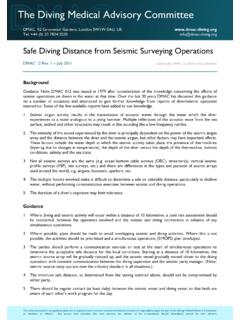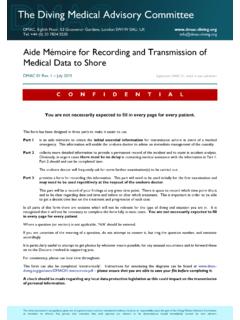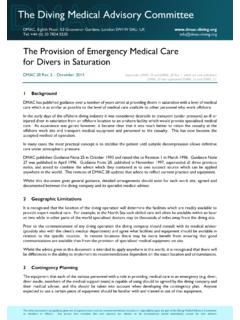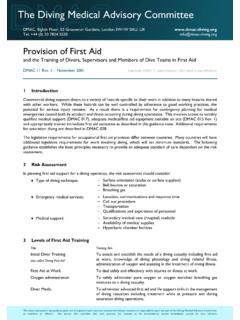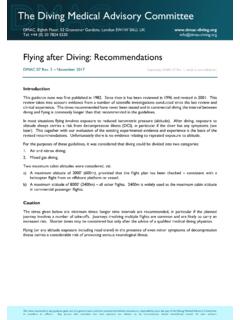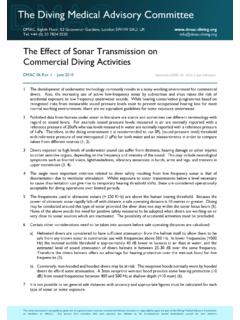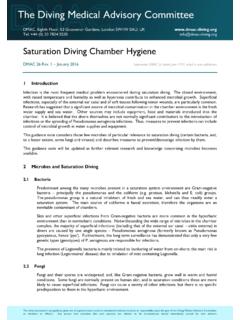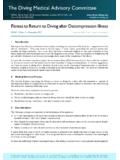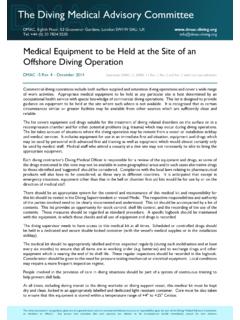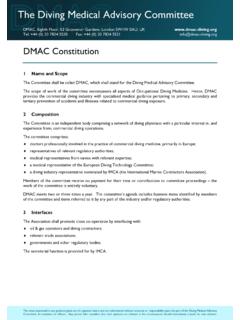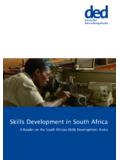Transcription of The Diving Medical Advisory Committee
1 The Diving Medical Advisory Committee DMAC, Eighth Floor, 52 grosvenor Gardens, London SW1W 0AU, UK Tel: +44 (0) 20 7824 5520 The views expressed in any guidance given are of a general nature and are volunteered without recourse or responsibility upon the part of the Diving Medical Advisory Committee , its members or officers. Any person who considers that such opinions are relevant to his circumstances should immediately consult his own advisers. Approval of Diving Medicine Courses DMAC 29 Rev. 2 January 2014 Supersedes DMAC 29 Rev. 1 which is withdrawn 1 Objective This guidance is for those who seek international approval for the recognition of courses in Diving medicine for physicians. At present this recognition is available for only two specific types of courses that have been selected as now needed in relation to Medical support more specific for working divers.
2 It is important to note that working divers would include some recreational Diving instructors and Diving guides, the needs of doctors who are associated only with recreational Diving have not been specifically addressed by this Committee . Some course organisers may wish to add extra lectures and/or practical sessions on recreational Diving at their discretion. However, such modifications must not affect the integrity of the accredited/approved course and would not be assessed by DMAC/EDTCmed. This note has been reissued now and is based on the 2011 revision of the EDTC Training Standards. Some chapters of this guidance have therefore been modified since revision 1. 2 Background Legal regulations and industrial standards concerning training of doctors involved in examination and treatment of working divers and the Medical consultants to Diving contractors vary throughout the world. Many professional divers work in different nations as a part of their employment and, even though the guidance on Medical standards for fitness to dive is reasonably well established internationally, the training of doctors to conduct those examinations and to provide competent support for Diving emergencies appears patchy.
3 Accreditation or approval of courses in Diving medicine would probably best be achieved if multi-national agencies (such as bodies within WHO, ILO, UEMS or EU) or well-reputed academic institutions with international connections would accept such a responsibility. However, in spite of agreement for many years on the need for approval, little or nothing has happened. In 2004 the European Diving Technology Committee (EDTC) produced its guidance on the Medical Assessment of Working Divers . This has been published by the International Marine Contractors Association (IMCA) and is available on the EDTC website. Previously, a joint Committee of the European Committee for Hyperbaric Medicine (ECHM) and EDTC developed Educational and Training Standards for Physicians in Diving and Hyperbaric Medicine . At present, this remains the best recognised international standard for such training. However, no organisation has accepted responsibility for administering an approval procedure for these basic courses.
4 Until another recognised body takes on this responsibility, DMAC has accepted the obligation to assess selected courses in Diving medicine together with a representative of the EDTC Medical Subcommittee; this alliance is to be referred to as DMAC/EDTCmed . It is emphasised that DMAC/EDTCmed will approve only the courses and not the competence of those who have attended them. DMAC is not constituted to be in a regulatory position and have a procedure for assessing the training record, experience and competence of individual doctors. That needs to be done in conjunction with other aspects of professional qualifications and accreditations overseen by legislative bodies at a national level. Page 2 January 2014 DMAC 29 Rev. 2 Course Scope To be considered for approval the course should be compliant with the ECHM-EDTC Educational and Training Standards for Physicians in Diving and Hyperbaric Medicine.
5 A copy of this document, which is for all health professionals in hyperbaric and Diving medicine, can be downloaded from When any proposed changes to the sections concerning Diving doctors have been approved by EDTC, an amended version of that section will be added to the EDTC website. The application for course approval should demonstrate compliance with the attached Curriculum Checklist in Appendix A. The application form should clearly state for which of these two categories (or both) approval is sought: Level 1 Medical assessment of divers ( Medical Examiner of Divers); Level 2D Medical management of Diving accidents and illnesses ( Diving Medicine Physician). Organisation and Responsibilities, Course Faculty The application must clearly show how responsibilities are shared. As a minimum, the application must identify the administrative aspects (legal, economic, personnel) as well as professional responsibilities of the faculty members (including a description of their relevant professional background).
6 The application must identify the person(s) having overall administrative and professional responsibility of the course. The application should list how many times the course has been arranged and, unless new, the number of students who have previously attended. Students The course programme should clearly state the acceptance requirements (professional skills/training) for candidates. Curriculum The detailed curriculum should be attached to the application. The curriculum should define contact hours, main topic and training objective of each lesson (theoretical or practical) and identify the teacher or trainer responsible. The curriculum should demonstrate compliance with Appendix C. A course will usually be approved for either a Level I or a Level 2D approval. If the applicant would apply for dual approval (Level I and Level 2D) the application must clearly describe the extent and progression of training as well as examination for each course/level.
7 The checklist demonstrating compliance with Contents of Modules should be attached. If any non-compliance is identified, the reason for this should be explained or details offered of corrective actions to be instituted. Applicants are advised to use the Training Objectives for a Diving Medicine Physician (available on the DMAC website at and also available from the EDTC website) and the ECHM-EDTC Educational and Training Standards for Physicians in Diving and Hyperbaric Medicine as a guideline for actual course contents for Level 2D courses, though these training objectives are not considered a normative standard by DMAC. The applicant may be required to submit the following documentation (in part or full) to be considered for review of approval of the course by DMAC/EDTCmed: PowerPoint presentations of selected lectures or other lecture material which allows the reviewers to adequately evaluate the content as such of the course for its relevance to commercial; List of cases presented on the course: type of diver, type of industry, problem discussed; Exam questions (see point ).
8 DMAC 29 Rev. 2 January 2014 Page 3 Computer Based Training/e-Learning DMAC/EDTCmed acknowledges the potential for computer based training (CBT)/internet based training. As long as the training objectives are reached, the applicant may include such training as part of the course. Due to the requirement for practical training, DMAC/EDTCmed will not recognise basic Level 1 and Level 2D courses based on CBT alone (this may be considered for some refresher courses of a Level 1). Further it is a requirement that the final examination includes tests related to CBT to ensure that the individual student actually has sufficient knowledge of those topics covered by CBT. When CBT is included as part of the course, the applicant must ensure compliance with these requirements: Detailed curriculum of the CBT identical to paragraph above/Appendix C must be submitted; The application must describe how the students are tested/training objectives are measured during the CBT session(s); The application must describe how the course ensures that the training objectives of the CBT are tested at the end of the course.
9 Video Documentation When a course is approved, the DMAC/EDTC working group may require the applicant to provide video documentation of a maximum of 3 contact hours of training from the next course (not necessarily in the English language) on DVD for review by the working group (any other format should be agreed in writing between the applicant and DMAC/EDTCmed). Based on the course curriculum, the DMAC/EDTCmed working group will decide at least 14 days before the course starts which contact hours the applicant is to video. Failure to provide video documentation will normally cause withdrawal of DMAC/EDTCmed recognition. If the video demonstrates some unsatisfactory teaching standards, the course director will be asked for a statement which should include his plans to revise the programme in the future. Examination Students receiving a course certificate or diploma should demonstrate sufficient knowledge according to the scope of the course.
10 The application should detail how the students will be examined and the pass/fail criteria. A written examination is mandatory. The application should detail whether and how a student failing to meet the training standard could undergo re-examination. The applicant is requested to forward a representative sample (approximately 25%) of the exam questions ( if the students are given 20 questions in the final exam, 5 representative questions should be forwarded). Course Certificate An approved course is eligible to state in the diploma or course certificate that the course has been approved by DMAC/EDTDmed for training, as appropriate, of: Level 1 Medical assessment of divers ( Medical Examiner of Divers); Level 2D Medical management of Diving accidents and illnesses ( Diving Medicine Physician). DMAC/EDTCmed does not approve training of other categories of personnel and any non-physicians who participate in the course must not receive certificates or diplomas that indicate DMAC/EDTCmed approval of training.
